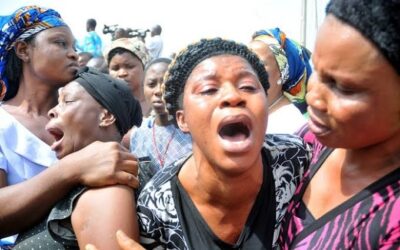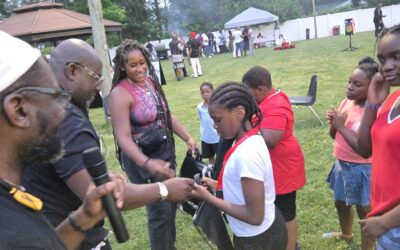Being the text of a paper delivered by Mr. Ejike Okpa II at the NAS International, Netherlands Chapter seminar on Good Governance and the Nigerian State on May 22, 2004 in the Netherlands.
At nearly 44 years old, one civil war, multi-ethnic and tribal groups, on going inter and intra ethnic clashes, experimental parliamentary government, unstable and hardly understood presidential leadership, longer-than-necessary military rules, 15% of Africans residing within its borders, natural resources that are the envy of its neighborhoods and the world, Nigeria is yet to find an endearing place among its people and has not earned the respect of the world.
For a country that is endowed with both human and natural resources one often wonders, what needs to happen for Nigeria and its leadership to do the ‘right thing’? What is the ‘right’ thing? Before answering the question, Nigeria reminds me of one that is taking a bath and happens to have a strand of soap foam enter the eyes. In reaction, it cries out for help and in doing so kicks the water that would have helped take care of the situation, by not reaching out to the water within its reach.
Is the country neglecting its talents and reaching out beyond its borders for help? A resounding ‘Yes’, and justifiably so. But what is it that does not reside in Nigeria to help in moving the country forward? For a people to realize its potential it must have an effective leadership and governance designed and hoisted on achieving goals and objectives to let its populace join unconditionally in developing itself. Nigeria leadership past and present has not enjoined the populace in realizing its dream of governing. Good governance has eluded Nigeria and it does not matter what section of the country or group that end up running its affairs, the result of the leadership has been dismal.
But should the present situation be deterring with a level of despondency that Nigerians should give up? No! What exists today calls for all hands to be deck and all to imbibe the spirit and mantra of ‘Truth Before Cant’, ‘All Before Self’ and ‘Change Over Stasis’. These do not need explanation but in summary, it means that Nigerians must adopt a practice of selfless service with unconditional and unqualified capacity to go the extra mile. In that mode, see that justice is done and that what we set out to do as a nation is done with the interest and benefit of the masses.
For good governance to exist there are certain attitudes and practices that need to be hoisted and promoted among the various groups that make up the nation. No one group or groups must embark on the notion that they alone have the ‘God-given’ position to govern. In every group are men and women whose disposition in life is necessary in providing the sort of leadership that is needed. We must not promote one group over the other nor overlook any group no matter their number in the overall scheme of things. If we believe in ‘One Nigeria’, it behooves our leadership and ourselves to reach out to all and not a fraction. Nigeria will never realize its potential when some elements in the whole promote sectionalism or fractional advantage because of their number, might or religion.
In searching the archives and poring over annals of successful nations as it relates to geo-political and socio-economic developments, one thing stands out as key in helping them reach their height. That one key is ‘TRUST’.
This five-letter word is the core of any successful society or individual. Societies do not develop or govern well if there is no TRUST among the leadership and the led. A simplistic definition of TRUST is: ‘firm belief in the reliability, strength, confident, expectation, and responsibility, on someone or an institution. In Nigeria, we lack trust among ourselves and without it, we have uphill battle in our quest to build a nation. Trust is developed when we become reliable and responsible. As we examine our collective experience, we need to ask, have we had a leader that a good number of Nigerians trusted or can trust? No we have not.
We have either taken them as they come or tolerate them because we had and still have no choice in removing them when they betray the trust. When we trust, we become reliable and responsible, and we can account for the resources in our care.
Accountability is one of the core challenges that face the nation at its micro and macro levels. It does not matter what the political subdivision is; local, state or and or national governments, there is hardly accountability. Nigerians frown when asked to account for anything and because such an attitude was never taught as a social order and principle required for public service, when we end up in power, we are prone to wanton disregard to use and deploy national resources and common wealth to suit and exceed our individual appetite. It is no a brainier that Nigeria has squandered several opportunities because the leaders are never held accountable by the led/follower. There are hardly consequences for abuse of public resources and diversion and conversion of common wealth assets to personal use. We must imbibe the spirit of accountability and hold those accountable for any abuse thereto.
Because we hardly account, we are Corrupt. Anyone whose sensibilities are offended is excused. But it is common knowledge that Nigeria is considered the most corrupt nation and people in the world. Whether this is true or not, is another issue. But Nigeria is stagnated because of corruption, which is an after birth of no trust, lack of accountability and responsibility.
Corruption in its basic definition is; decay, bribery, dishonesty, error in judgment as well as action. When one of us be he/she a tribal member, friend, colleague, gets into office or position of authority, what do we do? We celebrate the arrival and opportunity to milk the system and make money for ourselves. We do not celebrate the service to be rendered but what the service hardly rendered will do for the individual’s ability to get rich at the expense of the nation.
And since we hardly trust each other in hiding the wealth gotten from the corrupt practice, the wealth is given to individuals who are not Nigerians to hide and at the end they hardly benefit anyone. We are all witnesses to the after shock treatments that those that were once in office get when they try to obtain the wealth that was given to someone to hide. When we imbibe and endorse this practice, the nation suffers. It is no gainsaying the obvious that leaders whose ill-gotten wealth is stashed in foreign accounts hardly enjoy the benefit when they leave office. We must fight corruption using all available resources within and outside Nigeria to make sure that our leaders are not robbing us.
To deal with corruption, we must embark on building civil societies and its attendant institutions such effective legal system that is independent and incorrigible. We must educate ourselves effectively in guarding and ensuring that common wealth is used judiciously in serving the people. We must not spare anyone of our leaders whether in office or out, if we determine that they have stolen from us.
In order to do this and more, Nigerians in Diaspora must play significant and quantifiable roles in marching the country forward. And how will Nigerians in Diaspora help?
Nigerians in Diaspora can be taken as those who are fortunate to have escaped the bad leadership that is plaguing the country. By their presence in these countries where at least public service is noble and corruption is dealt with, they must educate themselves as to these values and how the system works. Diaspora-Nigerians must build relationships with the political institutions wherever they are. Since much of Nigerian stolen wealth is stashed overseas, we must seek ways and means hinging on the goodness and legal facilities of the host country, to uncover these assets and see how to effectively repatriate them to Nigeria.
We must seek ways to make sure that anyone that is found to have being corrupt or enriched himself/herself with our public resources serve deserving time in jail and if they relocate to another country pursue legal action against them. By so doing, we will be sending signal to the world. This is not an easy task but there are agencies and institutions that can assist if we mean business.
We must invest in education and this is not learning letters and numbers. But in equipping the minds of Nigerians to be cognizance of their nation and the role they can play. The leader is bad because the people led are bad or chose not to care. The head cannot claim to be ‘good’ if the rest of the body is sick and rotten. That large number of Nigerians chose not to do anything when they know their leader is stealing from them invariably provides the opportunity to continue to abuse. By educating us as to the various roles, we will see the positive results and be empowered to stand up to any abusive leader.
In furthering our civil institutions, we must create an identity that is suitable for Nigeria and that is Nigerian. It is still a thing of awe that more than 40 years after independence, Nigeria still find itself enjoying, imbibing and wishing for the societal and cultural attributes of its former colonial master.
The United States of America is successful because after it severed ties with UK; its colonizer, it sought and developed institutions and values that are different from that of its ex-masters. In Nigeria, we are still enamored by such British values as ‘Sir’, Your Excellency, titles and letters before and after our names, a class system built on hereditary and not competency or service.
Until we develop a positive identity that is opposite from what the colonizers left behind, we may continue to be a dependent people after more than 40 years of independence. We have what its takes to be a viable and valuable nation with varied interests and higher standards. It is about time we saw some good in doing GOOD when given the opportunity to serve. We must never look elsewhere when abused by those we have given the opportunity to serve.
That our tribe’s member is president, governor or senator, does mean anything to the whole if all is suffering. Nigerians must down play tribalism and reach out for and to well meaning and God fearing Nigerians that are willing and able to overcome the conventional wisdom and do what is RIGHT.
Thank you for the honor and opportunity to share these views. They are just some of what we can do. It is not going to be easy but for sure we can do well for ourselves in our lifetime if we overcome our doubts and prevail over our shortcomings. We are a good bunch but we just don’t know it. And for sure, we need not be the ‘one with soap foam’ in our eyes crying for help when all we need to do is reach within the available resources to take care of the problem.
Ejike Edward Okpa II
Mr. Okpa has lived in Dallas since August 1985 and is the owner of a real estate appraisal and service company for some years. He is 2nd Vice Chair of the Board of the Dallas Black Chamber of Commerce, as well as Chair of International Trade and Relations and Business & Economic Development Committee. Was Mayor Kirk’s appointee to the City’s Permit and License Appeal Board and also served on the Census 2000 Complete Count Committee. He traveled to three countries with Mayor Kirk on trade missions including visit to Washington DC with Mayor Kirk to invite Ambassadors to the 20th Anniversary of Dallas Ambassadors Forum. Was appointed by the President to serve on the Texas Board of the US Selective Service Systems under Region II. He is an Alumnus of Dallas Police Citizen’s Academy – Class 17, 1999 and Dallas FBI CA 2003. Participated in Dallas Business Journal – Roundtable on ‘Branding the Metroplex’; June 2001. Dallas Mayor Hon. Laura Miller appointed Mr. Okpa to Chair the Martin Luther King Jr. Community Center. He is active in the African immigrant community and conducts workshops to assist the new immigrants get involved in their new environment. Mr. Okpa was a candidate for City of Dallas Mayor in May 2003 General Election, finishing third in a five-candidate lineup. And subsequently, Dallas Morning News in their Editorial page of May 6, 2003, identified him as one of the ‘Up and Comers’ and one that should be included in the public policy mix of the region.



